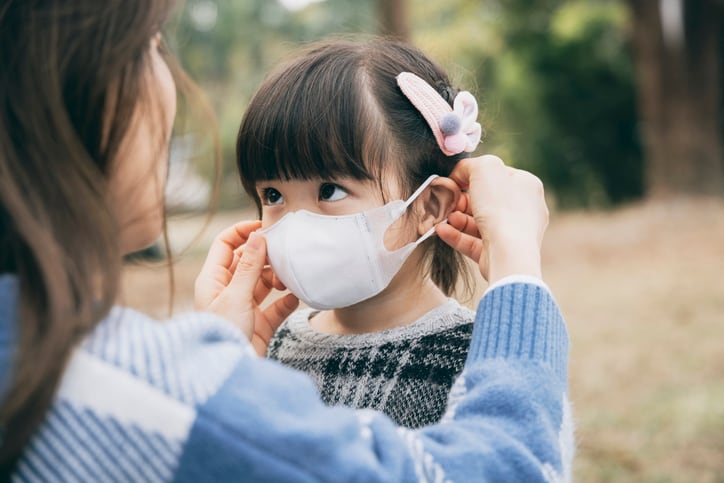The study marks one of the first human trials to evaluate the effects of this specific probiotic strain on child respiratory health.
Researchers from institutions in both countries found that toddlers who consumed the probiotic — known as Bifidobacterium longum subsp. infantis YLGB-1496 — experienced fewer respiratory symptoms and had lower levels of salivary cortisol (a hormone linked to stress and inflammation).
Fewer common cold symptoms
The 12-week randomized, placebo-controlled study followed 120 children between the ages of one and three who showed at least two signs of respiratory illness, such as fever, cough, or runny nose.
The children were divided evenly into two groups: one received a daily dose of the probiotic and the other a placebo. Both products were identical in appearance and packaging, the only difference being the contents (either the probiotic mixed with maltodextrin or maltodextrin alone). Parents were instructed to mix one sachet daily into each child’s water or milk.
By the end of the trial, 115 of the original 120 participants had completed the full 12 weeks. According to the data, children in the probiotic group had a significantly lower incidence of several key symptoms, including fever, cough, sneezing, nasal congestion and runny nose.
Although the probiotic group started with slightly higher rates of wheezing and vomiting, those symptoms also decreased over time and fell below levels reported in the placebo group by the end of the study.
Lower stress hormone levels suggest calmer immune response
The research team also collected saliva and stool samples from the children at three intervals —before the trial, at six weeks, and at 12 weeks. They analysed these samples to measure cortisol levels (from saliva) and several cytokines (from faeces), which are chemical signals the immune system uses to coordinate its response to infections.
Salivary cortisol levels were notably lower in the probiotic group after six and 12 weeks, even though they had started higher than in the placebo group at the beginning of the study. Lower cortisol may reflect reduced stress or a better-regulated immune response in the body.
However, the probiotic had no significant effect on common inflammatory markers like interferon-gamma (IFN-γ), interleukin-1 beta (IL-1β), IL-4, IL-10, or IL-13, which are immune system signals typically activated during infections or inflammation.
This means that while the probiotic may help with symptom relief and stress hormone reduction, its exact effect on the immune system remains unclear. The researchers also noted that faecal cytokine levels were influenced by many factors and might not fully represent internal immune activity.
Reduced antibiotic use and doctor visits
One major concern in paediatric care is antibiotic overuse for respiratory infections, many of which are viral and don’t respond to such drugs. In this study, the probiotic group showed a lower risk of using antibiotics and needing a clinical visit compared to the placebo group.
However, after adjusting for variables like diet and delivery method (such as Caesarean section births), these differences were no longer statistically significant. Despite this, the researchers considered the downward trend promising.
Breast benefits for the gut
B. infantis YLGB-1496 was originally isolated from human breast milk, and has been shown to survive in harsh gut-like environments. Iat also adheres well to intestinal cells, which may explain its beneficial effects.
The gut plays a key role in immune health, especially in children, whose immune systems are still developing. Probiotics like B. infantis can influence the balance of good bacteria in the gut and help the body respond better to pathogens, even those in the lungs — a connection referred to as the ‘gut-lung axis’.
Limitations and future indications
One of the study’s limitations was that it didn’t collect blood samples due to the participants’ young age. Blood-based markers can give a more accurate picture of systemic immune responses. Additionally, the symptom reports relied on parental observation, which could have introduce bias.
Future studies could expand on this work by testing different probiotic doses,, measuring antibiotic frequency and dosage, including blood-based immune markers, and increasing the sample size.
Still, the study marks a significant step toward identifying effective, strain-specific probiotics for respiratory health in toddlers. B. infantis YLGB-1496 reduced common symptoms, lowered stress-related hormones, and showed potential to reduce medical visits, all without causing side effects.
While not yet ready for clinical guidelines, this probiotic shows strong potential for integration into child health supplements and functional food products. For companies operating in paediatric health, probiotics, or functional nutrition, this could represent a valuable new area for innovation and product development.
Source: Frontiers in Nutrition
“Clinical effects of Bifidobacterium Longum Subsp. Infantis YLGB-1496 on children with respiratory symptoms”
https://doi.org/10.3389/fnut.2025.1537610
Authors: Pin Li, et al.




